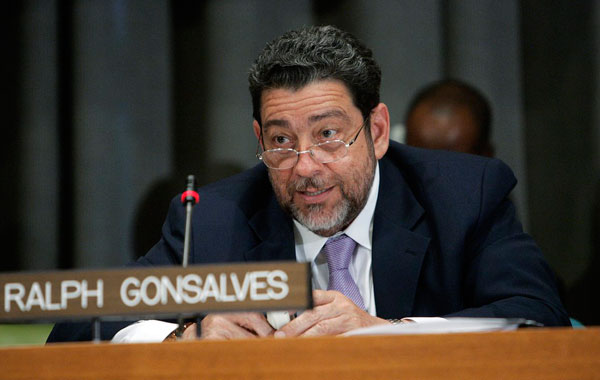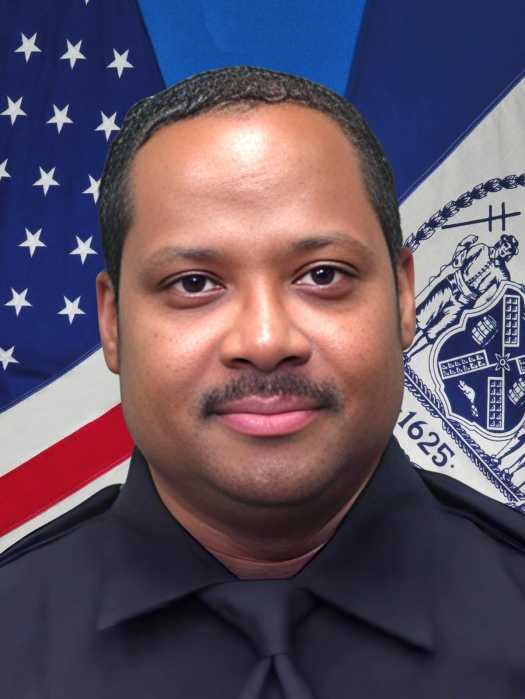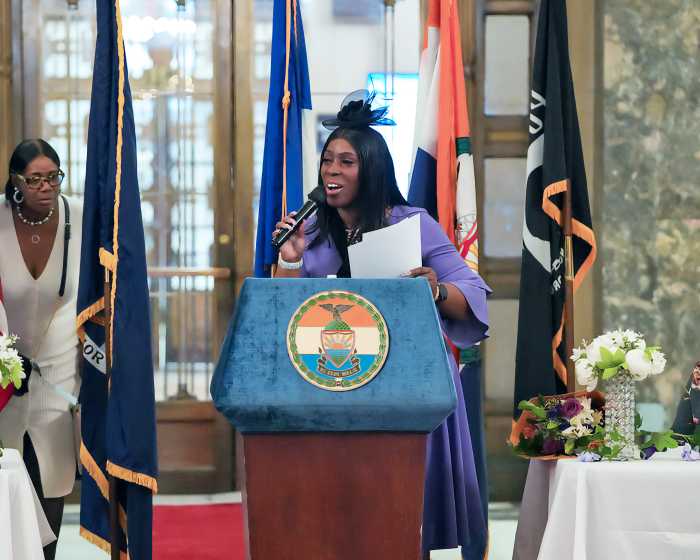A Vincentian judge in the United States has urged his compatriots not to give up on their goals, despite myriad hurdles they may encounter in attaining them.
In delivering the feature address at a gala luncheon in Brooklyn, New York, marking the nation’s 33rd independence anniversary, Judge Emille Cox, a Supervising Judge of Compensation in Camden, New Jersey, said he himself had to overcome numerous impediments at home and in the United States in achieving his goals.
“Don’t let anybody define you, or set your goals and limit your potential,” Judge Cox, who hails from Union Island in the Southern Grenadines, told the ceremony, organized by the Brooklyn-based umbrella Vincentian organization in the U.S., Council of St. Vincent and the Grenadines’ Organizations, U.S.A., Inc. (COSAGO), in conjunction with the New York Consulate General.
“In life, there will always be hurdles, but don’t let those mountains stop you from achieving your goals,” added Cox, the son of the late St. Vincent and the Grenadines’ Deputy Police Commissioner Philip Ruthford Cox, to rapt attention.
Cox, a former master at the elite St. Vincent and the Grenadines’ Grammar School, who taught English, French and Spanish in the lower- to mid- forms, recalled that he was unable to get one of the very few available scholarships after graduating in the 1965.
He urged young people not to be dissuaded by contemporaries, bosses or even parents from pursuing higher education, disclosing that a contemporary thought it was “farfetched” for him to apply for a certificate program at the prestigious Harvard University after he left secondary school.
After relinquishing his “mastership” at the then Boys Grammar School and becoming a broadcaster at WIBS (Windward Islands Broadcasting Service) in Kingstown, the Vincentian capital, the forerunner of the now National Broadcasting Corporation (NBC), Cox said he “had to learn one important lesson in life – there’s something called nepotism.” He did not elaborate.
He, however, said he “had to go overseas and get my degree.”
Cox said after pursuing a bachelor’s degree in economics at Long Island University, downtown Brooklyn, he worked, for three years, as a methods analyst and associate manager at Prudential Property and Casualty Insurance Company, in Holmdel, NJ.
But, one day, during his stint at the insurance company, Cox said he felt a sense of revulsion after telling his boss about his plans to attend law school.
He said his boss’ discouraging remarks instead “propelled” him to pursue his dream.
With an air of indignation, Cox then turned to the youth in the audience: “Young people, if your parents are urging you to get an education, make use of it.”
Claiming that Washington, D.C. is now “controlled” by ever-increasing lobbyists, the judge said opportunities for minority students in the United States are fast diminishing.
“Opportunities are not what they used to be,” he said. “If you’re encouraged, do it now, because we don’t know how long they (education opportunities and financial aid) are going to be there.
“Avoid being your worst enemy,” he warned.
In the same breath, Cox urged nationals to put their “best foot” forward in job interviews and in the work place, urging that they not to be coy or fearful in declaring their nationality.
“Don’t ever entertain the thought, or say to yourself, ‘they will never put me, a Vincentian, in that office,’” he said.
“When somebody meets you, it’s an opportunity to say where you’re from,” he added. “Bring your Vincentian work ethic to your job. You might be the first Vincentian your boss has met. And you know what first impression is?
“If somebody asks you where you’re from, use that opportunity to say ‘I’m a Vincentian,’” Cox continued. “At that moment, you are representing St. Vincent and the Grenadines.”
After graduating from Rutgers University School of Law in Camden, NJ in 1980, Judge Cox said he worked as staff counsel to the New Jersey Office of the Ombudsman for the Institutionalized Elderly, a state office charged with oversight of nursing and boarding homes.
Two years later, he moved to the New Jersey judiciary, beginning as a staff attorney in the Office of the Clerk of the Appellate Division of New Jersey Superior Court, where he had worked part time while attending law school.
In 1987, Cox became the office’s chief counsel; then, a year later, he assumed the role of Clerk of the Court – the chief administrative officer responsible for managing the duties of the entire Appellate Division Clerk’s Office. In the latter capacity, he said he managed a staff of attorneys, case managers and clerical personnel, numbering up to 80 employees.
In 2003, then New Jersey Gov. James McGreevey appointed Judge Cox to the Workers Compensation Bench.
Judge Cox said he has completed stints in Ocean, Middlesex, Mercer and Burlington counties in New Jersey. He is presently a supervising judge in Camden.
He has been the recipient of several awards, particularly from minority organizations and associations, such as the Caribbean Bar Association of New Jersey’s Leadership Award in 2010.
An engaging public speaker, Judge Cox has been asked to address audiences at various events and celebrations in New Jersey, New York, Pennsylvania, Montreal, Toronto and Ottawa, among other places.
These included the New Jersey Judiciary’s Black History Month celebrations, the St. Vincent and the Grenadines Girls’ High School Alumnae Association of New York, and the St. Vincent and the Grenadines’ Organization of Pennsylvania.
As Clerk of the New Jersey Superior Court’s Appellate Division and in his current capacity, Judge Cox said he has served as a panelist at numerous continuing legal education seminars and workshops.
He is married to the former Elvia Wilson, originally from Panama. They have a son, Byron, a daughter, Rena, and a granddaughter, Zuri.


























